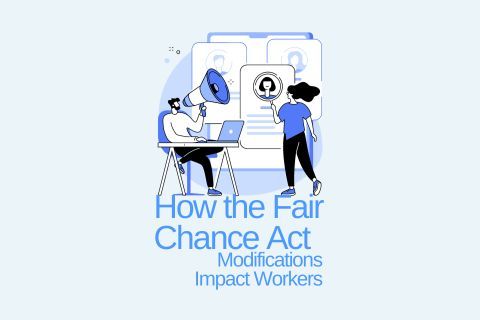How the Fair Chance Act Modifications Impact Workers
- Home
- Self-Check Blog
- Self-Check
- How the Fair Chance Act Modifications Impact Workers

September 15, 2023
The Office of Administrative Law recently approved modifications to the Fair Chance Act proposed by the California Civil Rights Council. The amendments will take effect on October 1, 2023. The Fair Chance Act helps individuals with criminal records by increasing their job opportunities.
It does so by restricting when employers can inquire about your criminal history and how they can use it. Furthermore, employers must follow a specific process based on your criminal record before taking adverse action. The current Fair Chance Act requires employers to offer conditional employment before asking about your criminal history.
This restriction also means they cannot run a background check before making this offer. After reviewing your background, employers may decide to take adverse action. However, the Fair Chance Act also details expectations before taking action. For example, employers must perform an individualized assessment before taking adverse action.
This assessment must consider the severity of the offense, how much time has passed, and its relevance to the job. Employers may decide to take action after reviewing these points. They must follow a two-step notification process if they choose to move forward with the adverse action.
The approved changes could help anyone with criminal records challenge or overcome potential adverse actions. For example, the Fair Chance Act will require employers to send a written notification explaining how your criminal record may disqualify you. This notice must detail the information influencing their decision and include a copy of the report used in this preliminary decision.
It must also detail your “right to respond to the notice before the preliminary decision rescinding the offer of employment becomes final.” In addition, it must explain that “the response may include submission of either or both of the following types of evidence: evidence challenging the accuracy of the conviction history report that is the basis for the preliminary decision to rescind the offer or evidence of rehabilitation or mitigating circumstances.”
Other modifications clarify what employers must consider during an individualized assessment and how you can challenge the adverse action. It provides examples of what evidence you can show mitigating circumstances or rehabilitation. Furthermore, the Fair Chance Act prohibits employers from taking some actions, such as:
- “Refusing to accept additional evidence voluntarily provided by an applicant or by another party at the applicant’s request at any stage of the hiring process (including prior to making a preliminary decision to rescind the applicant’s job offer);
- Requiring an applicant to submit any of the additional evidence described in this subsection at any time in the hiring process;
- Requiring an applicant to provide a specific type of documentary evidence (e.g., a police report as evidence of domestic or dating violence), or disqualifying an applicant from the employment conditionally offered for failing to provide any specific type of documents or other evidence.”
These requirements allow you a chance to convince the employer of your qualifications. However, the Fair Chance Act offers a short window to rebuke the decision. You have five business days from receiving the notice to respond. The Fair Chance Act requires employers to reassess their decision if you respond and explain why they should not rescind the job offer.
Furthermore, employers choosing to continue with the adverse action must allow you a chance to challenge them. The Act details how they must explain how you can challenge the decision or request reconsideration. They must also explain your right to file a complaint with the Civil Rights Department.
Overall, these modifications may benefit people with criminal records when seeking employment. However, you should still prepare for when employers conduct background checks. Consider running a self-background check to understand what they will see. Knowing what to expect allows you to plan your explanations or correct mistakes in your records.
Try running a self background check today and give yourself a head start on your next job opportunity.
